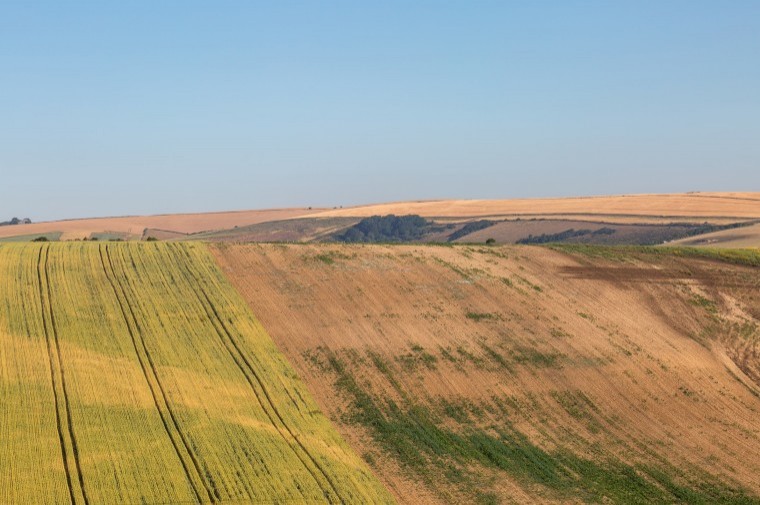Up to 24 July, the harvest at Court Farm was coming in dry, so there was no need for any drying. “That’s great,” said Mr Lingham. “We have just started the wheat, and some of it is not ready and is still ripening. It is still at 18% or 19% moisture content, and needs to be stored below 14%.” He has been direct drilling for the last 10 years to build the soil organic matter and make the soils more resilient to drought. “I think it is working.”
There are only 17 beef animals now which are on conservation grazing. “I am a lot luckier than some,” he added. He farms about 850 acres, which includes 200 acres of wheat, some oilseed rape, spring barley and winter beans.”
“The rape came in very dry, and somewhere between now and when I deliver it to the crushers, I will have to put some more moisture into it.” The rape has to be above six per cent moisture content, but Mr Lingham’s is at between four and six per cent. He was planning to use fans in store on a damp day to drive moisture into the crop.
He is thinking about what to do if there has been no rain by the middle of August for sowing winter oilseed rape. “Two years ago we had a dry autumn and I drilled the rape. It did not get established, the germination was uneven and it was attacked by the flea beetle. You have to learn from past experience.”
Simon Porter farms about 1,300 arable acres at Penn Croft Farms on the Surrey/Hampshire border. “I think the spring sown crops which were not planted until the end of April – peas, wheat and spring barley – have held on surprisingly well,” Mr Porter said on 24 July. “The spring wheat and the spring peas were just turning off green a week ago. On the peas, some of the flowers have faded because the plant knows there is not enough moisture around.”
In the previous week, Mr Porter had been “pleasantly surprised” about how few cracks he was seeing in the ground. “Years ago, when you went into the grain fields you could put an adjustable spanner down a crack.” In the week of 24 July, cracks were showing up a bit, but some six years of conservation agriculture has put a lot of organic matter back into the soil. “Perhaps this is softening the effects of the drought,” said Mr Porter.
Oilseed rape yields have been average, but Mr Porter said the crop was not affected by the drought. On 23 July, Mr Porter harvested three fields of milling wheat totalling 80 hectares in 11 hours. “The wheat is cutting very easily because the straw is short, yields are not high and everything is very fit.” Yields on the three fields vary from eight to 8.4 tonnes a hectare, and would normally be at least one tonne a hectare more.
Near Witney in Oxfordshire, Tim Hook has 420 head of stock grazing about 1,000 acres of grass and meadows: everything born on the farm is taken through to slaughter for beef or put back through the dairy herd. The farm also has about 2,500 acres of wheat, barley and oilseed rape. “We have changed from being an intensive livestock unit to more of an extensive livestock unit,” Mr Hook said. “This year is not abundant with forage, but we are not as bad as someone doing 400 cows on 600 acres.”
Crops are average and everyone will be feeding a lot more, Mr Hook added. “We have enough hay and straw to bale and send it via an agent to farms in Wales who are much worse off.”
Although the drought was not “a great situation,” Mr Hook predicted its full impact would take between six and eight months to unravel. “If we have a wet winter, the current feed shortages will be compounded by December, January and February time.” About 500 tonnes of hay had gone off the farm to Wales by 24 July, compared with about 200 tonnes last year. “It goes where they cannot make hay so they are having to feed their winter supplies now.” The price off the farm is usually between £40 and £45 a tonne, but this year it has doubled to between £80 and £85 a tonne.
With the oilseed rape having dried off, Mr Hook has had to harvest it very early in the morning to try to catch some dew. Like Andrew Lingham, he has to push the moisture content up to above six per cent, otherwise the crushers cannot extract any oil from it.




